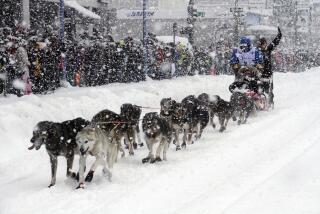Man finds dogs that deliver the goods : Sled driver’s team of Samoyeds pulls freight, travelers through the punishing snows of Maine.
- Share via
CARRABASSETT VALLEY, Maine — In the eerie-still woods, the deep whisper makes for a chilling noise--as unsettling as a dying breath. At once there is motion, and Tim Diehl’s team of dogs leaps forward to propel a sled that looks like it lumbered out of Adm. Robert E. Perry’s mission to the North Pole. Across the snow they romp, a throwback to the days before combustion engines, a monument to the land where snow rules the seasons.
The throaty “eee-yinh” noise that commands the Samoyeds to begin their trek is only one of the rules the 47-year-old Diehl has learned since launching his career a decade ago as proprietor of T.A.D. Dog Sled Services. Dog teams in Alaska, Colorado and elsewhere may live to race, but here in the woods that hug the Quebec border, Diehl’s fluffy white platoon cares only for pulling.
As Diehl harnesses up the nine dogs that will pull him and two adult adventurers through the wilderness, all 18 of his Samoyeds sometimes jockey for position--all the while wearing the legendary grin, the “Samoyed smile,” that distinguishes the breed.
Diehl’s venture is a testament to the independent, entrepreneurial, “just-getting-by” mentality that prevails in the rock-bottom economy of rural Maine.
Some families return year after year for sled rides, and many tell friends that the experience is worth a visit to countryside that looks and feels like something out of a novel by Stephen King (who resides just north of here).
Still, with veterinary bills and high-fat, high-protein diets to maintain, the burly, bearded Diehl is scarcely prospering. He last took a vacation a dozen years ago. As for his finances, “I’m just getting by,” he said. “This is a labor of love, basically.”
Diehl spent nearly 20 years as a ski lift operator at nearby Sugarloaf Mountain, one of this country’s earliest ski resorts. He worked as a logger and riverboat guide, unmarried but not always unencumbered. One day, he decided that what he really needed was a dog.
Diehl did his research. Living in a place where the snow often averages 14 feet per year, he determined that “you’ve got to have a dog that is going to be outside with you, take the elements, not fuss too much.”
The Samoyed, Diehl concluded, was “an appealing dog. They look like big marshmallows. But they are real tough workers.”
His first dog came from an animal shelter. Soon he acquired a second Samoyed, whose owner was fed up because the beast kept pulling the lamp post over.
Diehl began exercising them by hooking them up to bicycles, and “along the way I kept on finding these dogs that needed homes. I just kept on getting dogs, and I kept on exercising them.” He took to running them at night, on the off-hours from his day jobs.
He fantasized that his dogs would lead him to fame and fortune, not necessarily in that order. So for several years he showed up at sled dog races dominated by the more fleet-footed Huskies.
“We never came in last,” Diehl reported. But with nine dazzling white dogs tied together, “we always had a lot of pictures taken. I imagine people were saying, ‘Here comes that fool with the Samoyeds.’ ”
It finally occurred to Diehl that what he had were freight dogs, not racing dogs.
Eventually, said Diehl, “I made some friends who realized I was no competitor. They’re the ones who really helped me.” They taught him, for example, to urge his dogs forward with a sharp initial command that resembles a human’s dying breath.
Diehl supplemented his sledder vocabulary with phrases such as “on by,” which tells the dogs to avoid an obstacle and head straight forward, or “Gee back,” which commands them to turn the team around. For praise, in a soft voice Diehl reiterates: “Good good, good good.”
Most of his clients are skiers or other outdoors enthusiasts who ride the sleds for adventure. But in summers, when he hooks the dogs up to carts, he hopes to attract corporate executives who, he surmises, might study them to learn something about true teamwork.
Diehl has also provided a canine limousine service at several rustic weddings. The dogs deliver the bride to the altar, and sometimes whisk the newlyweds on a spin through the woods. The bride wears white. So do the dogs.
More to Read
Sign up for Essential California
The most important California stories and recommendations in your inbox every morning.
You may occasionally receive promotional content from the Los Angeles Times.









